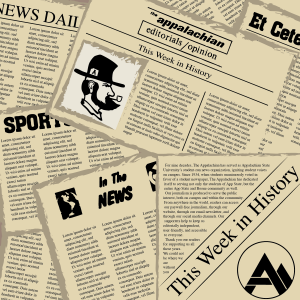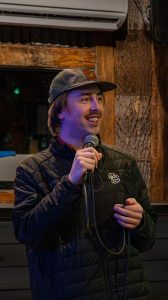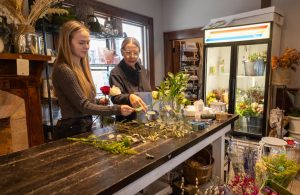Counseling graduate student awarded scholarship for focus on rural communities
March 24, 2020
App State graduate student Byron Reese Wells was awarded an $8,000 scholarship from the National Board for Certified Counselors.
“I’m really excited and grateful for NBCCF,” Wells said. “Through the scholarship I’ll be working with rural populations in order to pull in some elements of my own passions, which are mostly focused around nature-based interventions and mindfulness counseling.”
Wells is a student in the Clinical Mental Health Counseling Program at App State.
He was chosen for the Rural Scholarship for his commitment to in-depth growth of others and himself, according to Tory Cherry, communications and development manager for the NBCC Foundation.
The NBCC Foundation’s mission is to leverage the power of counseling by strategically focusing resources for positive change.
“His counselor identity and support of working with an ecotherapy approach to help others explore, health, and grow is a needed and innovative addition to the counseling world,” Cherry said.
Making counseling services accessible in rural populations is one of Wells’ passions.
“There’s this real need for counseling services in rural populations because access to services is pretty limited,” he said.
“Reese is a natural fit for this scholarship,” said Mark Schwarze, assistant professor and director of the CMHC Program. “He has committed to understanding the mental health needs of people in rural areas and has solid ideas about what ways they can best be reached.”
As an intern at the Wellness and Prevention Center, Wells works with students who have conduct violations and substance abuse referrals.
“(Wells) is a natural counselor, easily displaying warmth, empathy, and unconditional positive regard. He will be an asset to the counseling field when he graduates,” Schwarze said. “He has experience in working with diverse populations and will do incredible things in this area.”
Wells said he focuses on forming therapeutic relationships with clients and utilizes body-centered therapies.
“I do a lot of present wellness awareness,” he said. “There’s a lot more than just like anxiety or depression, it’s all the different factors and elements.”
Wells asks his clients questions like, “Where are you feeling emotion in your body and how does that relate to what is going on in the moment?”
He also made a point to identify what people commonly associate as “problems” as merely just circumstances to overcome.
Wells said he always leaves clients with tools to apply what they have learned outside of the counseling session.
Wells said he values his self worth before everything he does for others.
“One of my best friends said, ‘When you fill yourself up, you can fill up your people,’” Wells said. “I really believe in that in order for me to show up as a counselor and help other people I have to also help myself.”
For Wells, this means committing himself to getting enough sleep, exercise and nutrition.
“On top of that, doing some self-care practices like journaling, playing music, going to see a personal therapist to help me ground myself,” Wells said. “From that sense of like grounding and calm, I’m able to better show up for my clients.”
He wants to offer the opportunity for those who live in rural populations to connect to the land through horticultural therapies and other wilderness style therapies, the same types of therapies that help Wells feel most connected to himself.
After graduation, Wells plans to work for Suws Of The Carolinas, a wilderness therapy program in Asheville.











